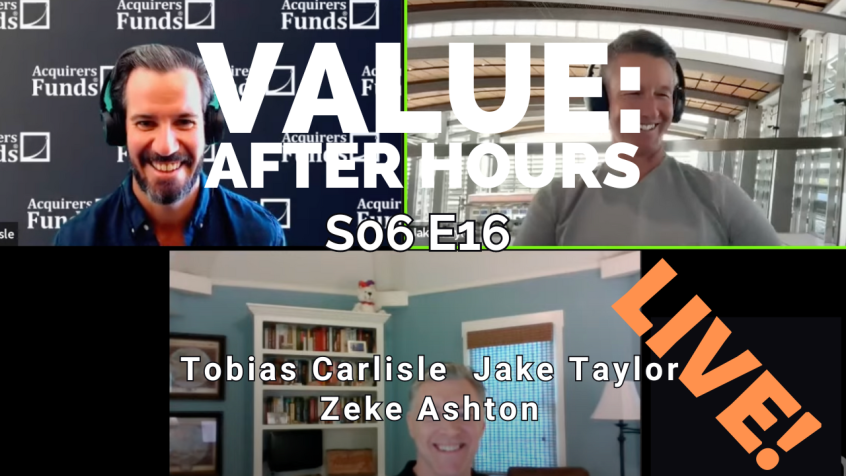During their recent episode, Taylor, Carlisle, and Ashton discussed Avoiding Growth Traps & Value Traps, here’s an excerpt from the episode:
Tobias: Zeke, let me just go back to something you said earlier. You said you were trying to– There were growth traps as well as value traps. Just define for us what those two things are. And then talk a little bit about how you avoid value traps.
Zeke: Yeah. So, the growth trap is, of course, when people extrapolate recent growth. Just like there’s a big value investing constituency, there’s also a big growth investing constituency that may actually be larger. As long as the company is showing strong growth trajectory, they want to own them. But unfortunately, many companies just will eventually run into some problem, and they can’t grow for a couple of years or by attempting to grow at very high rates, they actually start to run the business poorly, and they get declining returns on capital and this sort of thing. And eventually, that turns into a problem.
I think, by the way, Peloton is a tremendous example of that. Like in 2021, it just looked like they could grow for a long time. Then all of a sudden, the brakes just got turned on superfast. And when that happens, when people are projecting 20%, 30% growth for many years into the future, and then all of a sudden, that growth turns negative, there is a huge air pocket that has to be filled in, because the multiples go from multiples of sales oftentimes to multiples of earnings, and sometimes there’s no earnings. And so, there literally can be 80% peak to troughs before a value. Some constituency goes, “Hey, let’s take a look at this.” And that’s just how that goes.
But the value traps, there’s a couple of different flavors of these. But I think the one that people usually mean is if you find a stock that is truly undervalued and you own it, but the market never really does recognize that value. I think this is the flavor that David Einhorn’s been talking about a little bit recently when he says, “The market for value investing is broken and you have to find companies that can self-help a little bit by buying back stock or engaging in some other behavior to highlight the value.” But my belief is is that that’s a patience thing generally, that if you wait long enough and the company really is doing the right thing, if they’re buying back stock, worst case they’ll get acquired, but the waits can be very uncomfortably long.
What I will say is the value trap for me historically has been, when I’ve tricked myself into thinking that a business is slightly better than it is. Or, I was right about the business, but I was wrong about the management’s incentives. And so, instead of running the business in a way that could have maximized shareholder value, they tried to turn it into a growth business, or they tried to expand by acquisition or they were just poor capital allocators. That tends to be more what happens.
In other words, usually, there’s a catalyst for the value trap. Something happens that probably shouldn’t have happened, and that’s where you get it. But it is funny. I get asked about value traps a lot, but I don’t think a lot of people recognize that the growth traps are usually much more painful for people who are caught in them.
Tobias: Everybody’s been caught in value traps for the last 5 years or 10 years, so they’re more in recent memory, although I think that people found some growth traps after 2021.
Zeke: I think it is difficult to own a portfolio of stocks that just generally trade at low multiples to book or low multiples to earnings, because generally, you’re owning a collection of inferior businesses. So, you have to layer on something beyond that. Also, I think the market has gotten better at that. I think the screens– There’s a reason I don’t use the screens anymore. But I do think things like, obviously, your Acquirer’s Multiple, you try to be a little more sophisticated than that.
Tobias: Not much more sophisticated.
Jake: Yeah. No. [laughs] [laughter]
Zeke: Those who remember the magic formula from Joel Greenblatt, which was a very similar thing. I actually think that works too. The problem is the timescale is very long. And so, partly, that’s why I don’t have a whole portfolio of those. I like to have some growthier names in the portfolio as long as I can find them that are reasonably valued. I will also occasionally do the Benjamin Graham net working capital screens and see if there’s anything there that looks interesting. Although, as you might expect, that very rarely happens anymore.
You can find out more about the VALUE: After Hours Podcast here – VALUE: After Hours Podcast. You can also listen to the podcast on your favorite podcast platforms here:
For all the latest news and podcasts, join our free newsletter here.
Don’t forget to check out our FREE Large Cap 1000 – Stock Screener, here at The Acquirer’s Multiple:



